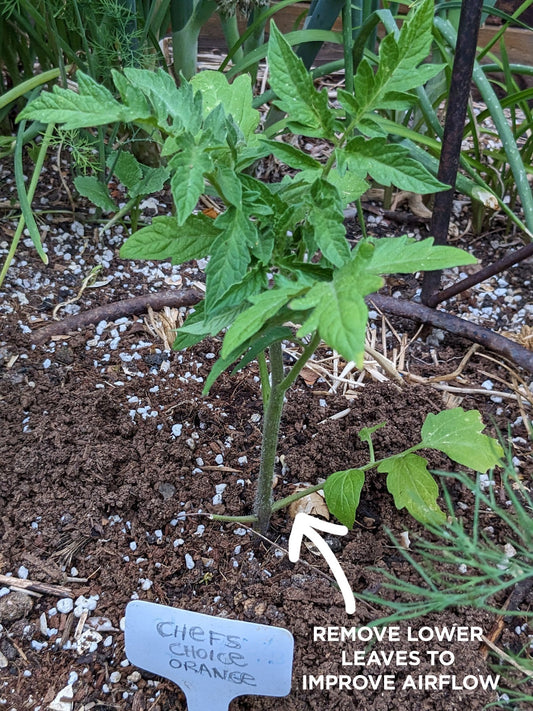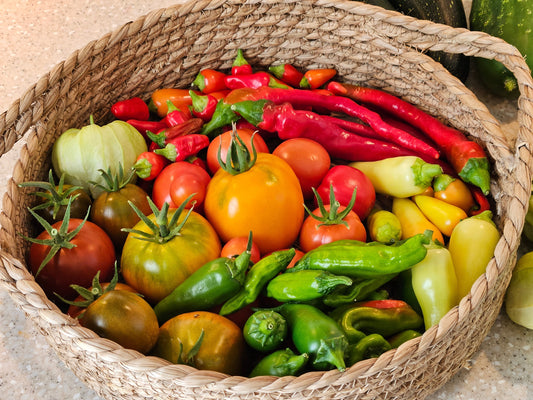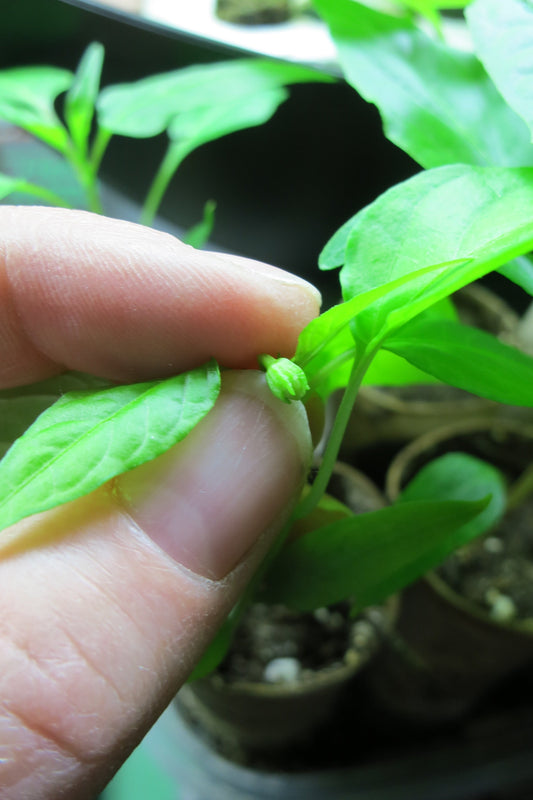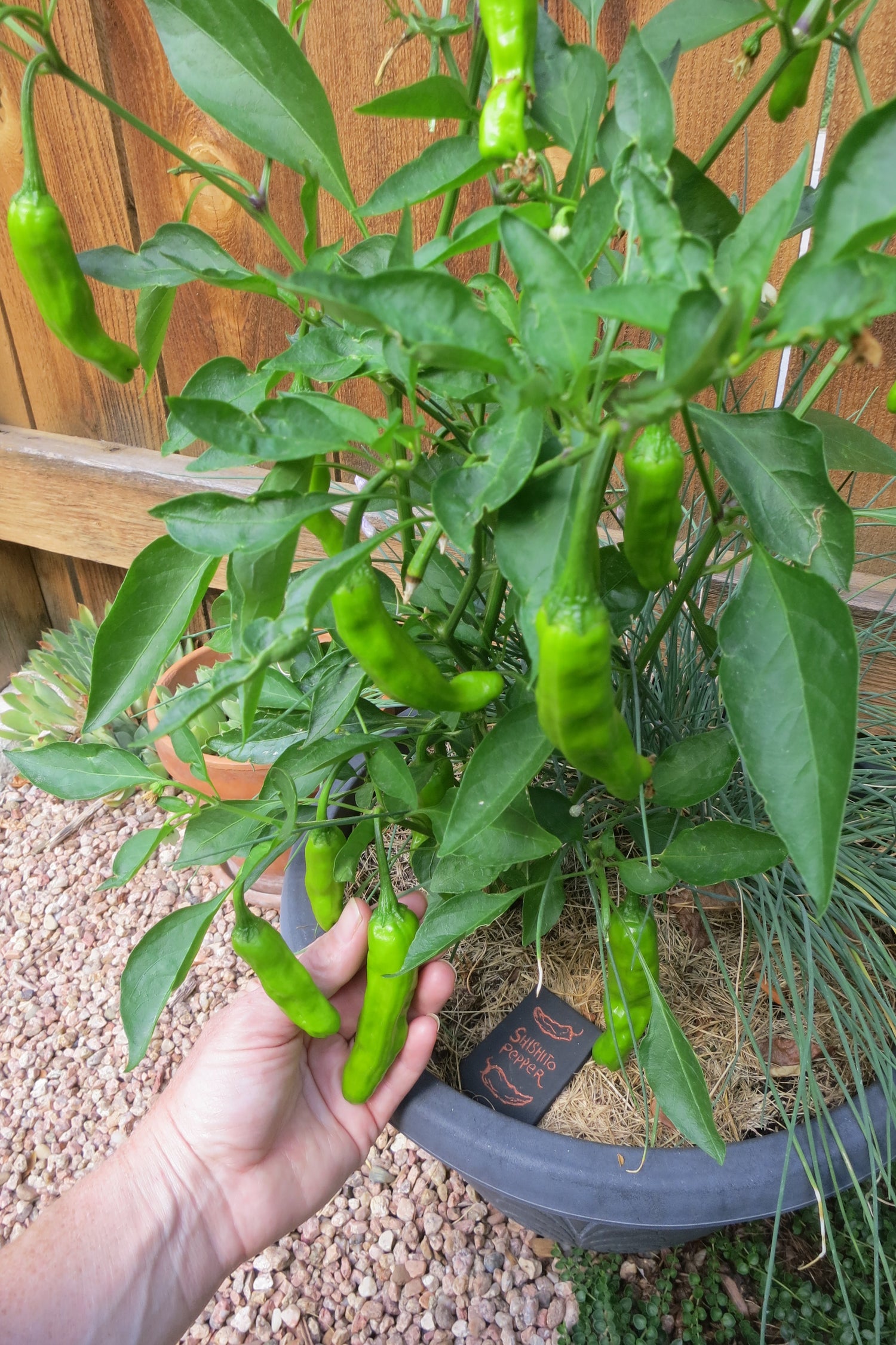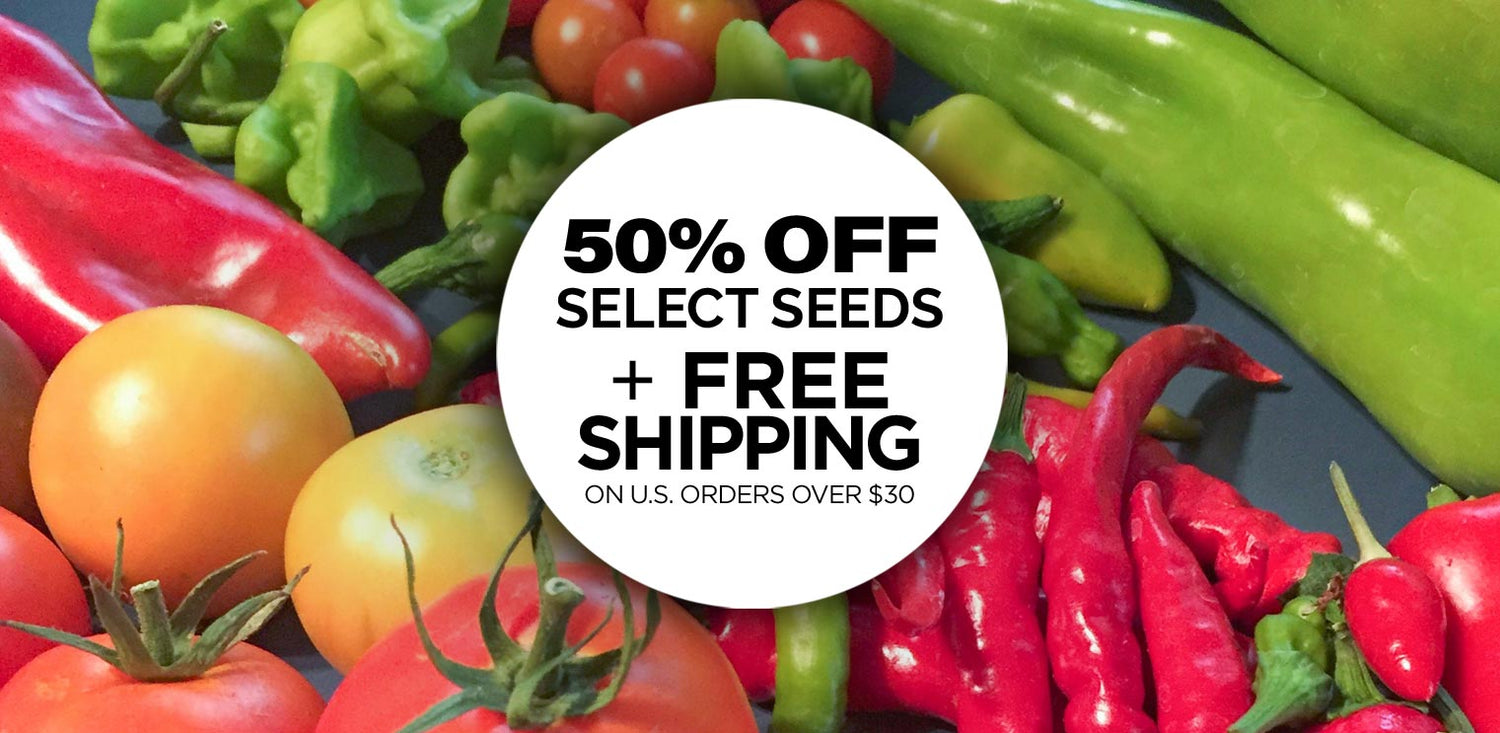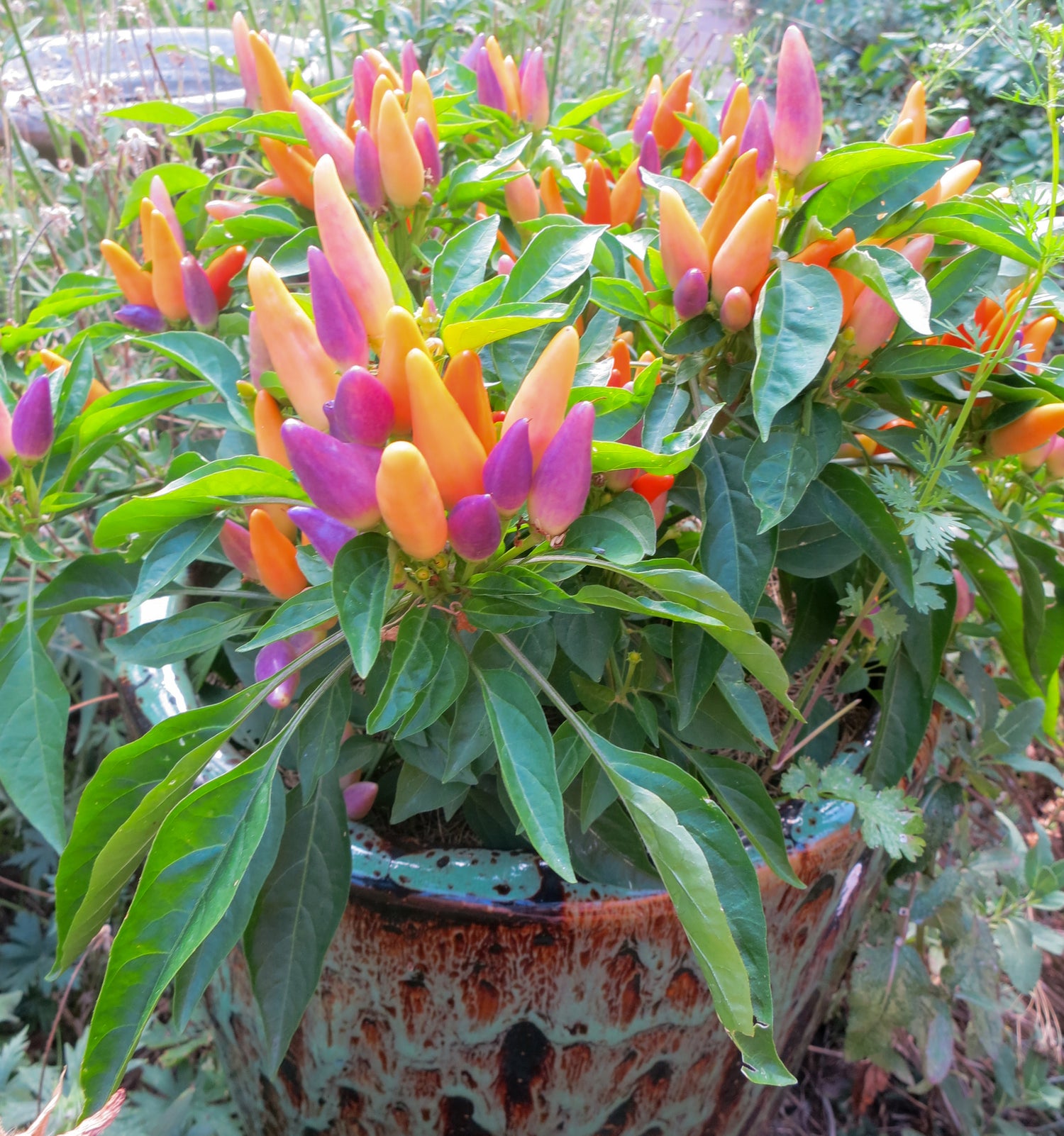
How to grow Chile Peppers in Colorado
All of our chile peppers, hot peppers and sweet peppers grow great in Colorado's hot and arid climate, providing that you start them early, and make sure they get enough water (but not too much water) throughout their growing season. The plains of Colorado have similar growing conditions to New Mexico, and so growing Hatch Chile seeds can produce the delicious green chiles everyone craves for stews, hamburgers, pizzas and more. While technically you can't call them "Hatch" unless they're grown in the Hatch region of New Mexico, we still think they taste amazing, because nothing tastes better than homegrown!

You can also use water walls (shown above) to put your peppers out earlier, as they protect peppers and keep them warm especially at night, during Colorado's crazy spring temperature swings. These can also help protect them from the frequent and nasty hailstorms that Colorado has in the spring and early summer months.
We have a great page of tips for growing peppers, this applies to jalapeños, serranos, green chiles, you name it:
How to Grow Peppers »

For the best Colorado Chile, check out our newest chiles we're offering: Mosco chile peppers. These Colorado chiles, shown above are the most delicious pepper you can find north of the NM state line. These are Mirasol chiles (they grow up towards the sun), and they are from Pueblo, Colorado. With a delicious meaty sweet flavored flesh and medium heat, these red Colorado chiles make the best red chile sauce!

Another wonderful Colorado-bred chile is the the Giadone chile shown above. These are also one of the most delicious peppers you can find north of the NM state line. These Colorado chiles are a type of Mirasol chile, and they are from Pueblo, Colorado. Their tasty meaty flesh has a wonderful sweet flavor and plenty of heat with a Scoville rating from 10,000 - 12,000 SHU.

With Colorado's hot and dry weather, you can grow lots of our New Mexican chile seeds. Homegrown green and red chile is the best, you can roast your harvest on your grill and use in all sorts of dishes!


Colorado weather is also great for growing any of our Jalapeño seeds, which come in several colors including one of our new customer favorites, the Yellow Jalapeño shown above, as well as the brilliant Orange Jalapeno. If you're a Colorado Chilehead, and you want it really, really hot, then don't miss all of our Super Hot Pepper Seeds. You can grow the hottest pepper in the world with our popular Carolina Reaper seeds, or check out all of the other super hot peppers that are perfect for hot sauces and salsas.
Sweet peppers are also great to grow in your Colorado garden. Don't miss the Japanese Shishito pepper which are a real treat, or try our Purple Bell Pepper seeds, or the super cute Mini Orange Bell Pepper that is great for snacking right in the garden or for putting on salads.
Colorado is also a great place to grow tomatoes. We have chosen our favorite Heirloom tomato seeds as well as Hybrid tomato seeds. that you can grow in your garden to complement your chiles. Don't miss the long-time favorite, the Cherokee Purple Heirloom Tomato or the beautiful Indigo Rose Heirloom tomato seeds.

Colorado can be a tough place to grow Peppers and Tomatoes:
Our Colorado seed customers have had a slow start this year with lots of cold nights, hail, and even a late snow storm! Here are some photos a customer sent in – she said that these chile plants, planted a month ago, haven't grown much at all since transplanted. But, the heat has arrived, so they'll take off now! You can see the Shishito's side shoots that are about to launch! That plant was in a Water Wall during the cold weather of late June and early July, and it seems a lot happier than the Chimayo who was left out in the cold. Glad the heat is here to help them along.
Tips for growing the Best Vegetables in Colorado:
Start peppers indoors early, but make sure they have enough room to grow until mid-May to early June, after the temperatures have warmed to at least 60˚ F at night (which we know, in Colorado, there is often 40-50˚ F nights often in May and June!). Waiting to plant them outside until after the soil has warmed up will speed their growth, while planting them earlier when there are still cold nights you may see stunted growth until the heat comes to stay.
A lot of Colorado gardeners report great success growing peppers earlier by starting them in plastic hoop houses to help heat the bed with solar energy. Water Walls are also used (water filled walls that surround your plants) which keep peppers warm, especially on cold spring nights. Tomatoes also like warmer weather but they aren't quite as sensitive to cold nights (below 50-60˚) as peppers are. 
Grow Companion Plants:
In the early spring in Colorado, it's good to also grow Pepper Plant Companions like perennial herbs such as Thyme, Oregano, and Chives, as well as cold-weather loving veggies like lettuce, kale, spinach, radishes and onions. When you grow these veggies and herbs in addition to your peppers and tomatoes, then you get to reap harvests throughout the season! We also love to grow lots of native flowers to encourage pollinators and beneficial insects and birds to visit our garden. 
Companion Plants for Pest Control:
Birds and insect predators are excellent pest control, so keeping a clean filled bird bath and growing flowers that birds and insects love like Sunflowers, Coneflowers and other seed-heavy flowers will encourage them to visit your garden and eat pests like armyworms, tomato hornworms and cutworms. By planting lots of native flowers, you will invite beneficial predators and insects to your Colorado garden which will help keep pest populations under control. The more Ladybugs, hoverflies, wasps and praying mantises you have, the better, as they eat eggs, larvae and adult pests.
Learn more about Plants that Attract Beneficial Insects »
Above is a Colorado-grown Shishito sweet pepper that has had a slow start this spring due to cold weather including snow and hail, but with a little cover it has survived what mother nature threw at it and it's now about to take off since the July heat has arrived. 
Above is a plant grown from our Purple Bhut Jolokia seeds, and boy it was loaded with peppers. Unfortunately, an early snow came (as it often does in Colorado), so this seed customer picked the rest to bring inside, luckily before any frost damage was done. Some Colorado gardeners will erect hoop houses and cover with plastic before early snowstorms to keep their peppers, tomatoes and other veggies warm to extend the growing season. Super hot peppers do take a long time before ready for harvest (100 days or more) so starting them early indoors and using covers for early snowstorms in the fall can help you get the most peppers out of your plants.
Also, if you pick peppers before they've ripened (if they're close to ripening), they will usually ripen on your counter. We've seen tons of peppers turn red or purple after they are picked. And, peppers are actually edible in their early stages as well as their fully ripened stage, so feel free to pick and taste them anytime throughout the growing season. If you pick a pepper and it tastes "green," then just wait another week or two and try another one until it has the flavor desired.
Show us your Colorado Vegetable Garden!
Tell us how your chiles are growing! Are you having a slow start, too? Tell us where you are gardening and what you're growing. ![]() You can share your photos with us on Facebook or hashtag us using #sandiaseed on Instagram.
You can share your photos with us on Facebook or hashtag us using #sandiaseed on Instagram.






